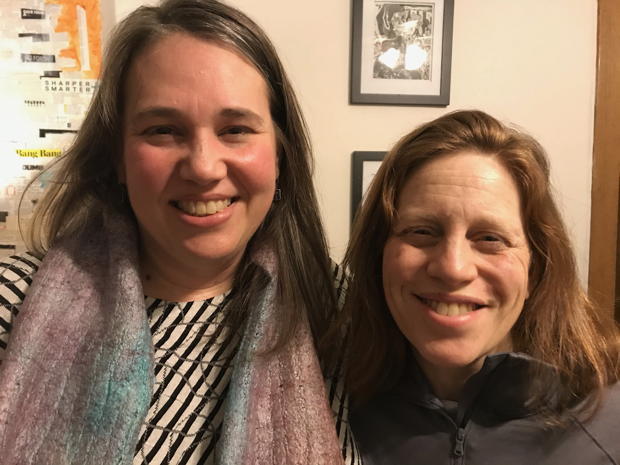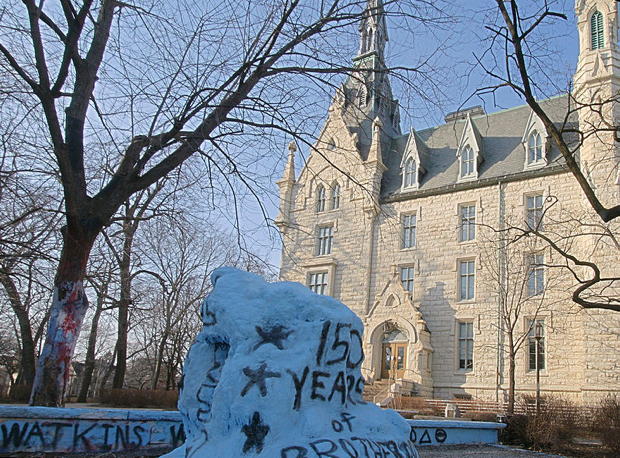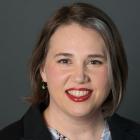The Rock in front of University Hall at Northwestern University.
Emery: Julie, what is your job and how has it changed in the past 2-3 years?
Julie: I’m the Director of English Language programs, a unit of the Graduate School at Northwestern University in Evanston, Illinois. We partner with the Department of Linguistics to provide English Language training and support to international graduate students and post-doctoral trainees.
In the past couple of years, our team has radically changed our premier orientation program, the International Student Institute. ISI is a language and acculturation program for international PhD and MFA students that we’ve offered since the year 2000. Northwestern University has gone through some fiscal challenges recently, so across the university, budgets were cut.
The International Student Institute was resource intensive; we provided stipends to up to 48 PhD and MFA students to arrive early and do an intensive English and acculturation program for five weeks, before the start of classes. When we first got wind that there was a deficit and budgets were being cut, we made some voluntary changes to reduce cost, including reducing enrollment by half. Then more drastic budget cuts needed to happen. It became clear that we would not be able to run the program that year. It looked like we just couldn’t offer this orientation to students. And that was challenging because the students were still coming to enter the PhD and MFA programs.
What emotions came up for you when this happened?
It was very hard and very frustrating. Frustrating because we could have prevented the problem if we had gotten the news sooner: we would have spent our resources differently.
I also felt a great deal of sadness and loss. This program, which I’d been part of from the beginning, was ending in a way. The Dean had the original vision for new PhD students and I was the grad student selected to lead the pilot program, so I had been involved at every stage of creation. This was my baby. I grieved the loss of the program. I felt really sad for the students who wouldn’t get to experience this community, because I‘d seen the difference it made for so many graduate students over the years to get this support. I was also scared of losing the program completely.
What were your conversations with God like?
I was honest with God about being angry and sad.
At the same time, I felt some hope and openness to change. I felt that this must be happening for a reason. I talked with God about how maybe this was an opportunity to make some changes we needed anyway. I realized that when a crisis happens, people are more open to try something new. It was a risky and I felt scared that we could lose the program altogether. Yet I also felt attracted to the opportunity to do something different.
How did your spiritual practices affect your leadership in this time of change?
I couldn’t share my spiritual practices with my co-workers, but I could tell that the peace I felt from God was reassuring to my direct reports. I had confidence that we could make a new plan work. Our new plan brought excitement to those who were discouraged. I couldn’t have had that orientation without my faith. It’s like I could hold stability and hope for others.
As I prayed with my women’s prayer group, I was able to process the feelings that came up and lean into God’s promises. As I worried about the students, God reminded me that he knows every student and what they need. He loves them more than I do.

photo: Julia and Emery
So what plan did you craft for International Student Institute 2.0?
We started to wonder: what could we do for the students with no additional cost?
Our team brainstormed in the midst of our crisis. We took our program and blew it up, creating a hybrid program. We delivered some online training before students arrived, while they were still in their home countries. Then we offered in-person community-building events for a few weeks in September, when they arrived on campus.
We had to work quickly to make it happen. We got the budget cut news in October and it took us a couple of months to discuss our options and embrace a new concept by December. Then we had six months to make it all happen. We went back to the drawing board around curriculum design: what did we want the international students to come away with? What topics were most important to educate them about so that they would thrive in the United States?
We had always used student peers to help the international students with language learning. We changed their role so that they were online peer mentors. Because their role was online, they cost less and we could hire more mentors.
We coordinated weekly assignments, activities, and online content. We had more time to talk about the personal parts of being a graduate student, such as academic integrity, culture shock, and homesickness. And students seemed to learn better in an online environment, without the challenges of jet lag and culture shock. But we couldn’t do the traditional language instruction that we were used to.
What else were you concerned about losing in the new program? Any other disadvantages?
One of my concerns was if the students would still form strong friendships. I loved seeing the relationships grow in the 4-6 weeks during ISI. I knew that relationships could form online, but would it be the same quality as it was in the past, if they only had a couple weeks in person together? Would students participate?
We built some anticipation for the September in person events by having the students earn entry to each event by completing the coursework for a given week.
When we got to the first September social event, the students had some knowledge of their classmates from being online. The first encounter was nervous and awkward. But eventually the same magic happened as they got to know each other and started to support each other. By the end of the first event, they didn’t want to leave! We had to push them out the door. That same desire to get to know each other continued throughout the rest of the events.
Can you give any tips for our readers who may be facing budget cuts as faculty or administrators? What did you learn from the process?
It really helps to see the big picture, as wide a perspective as possible of the whole university. The university is a huge organism, yet faculty spend their lives in one small area so a budget cut can feel like a personal attack. But budget cuts are almost never personal — usually they reflect more about change at the top level.
What are you learning about leadership as a Christian university administrator?
The senior leadership above me really appreciated my willingness to be creative and open-minded in a disappointing fiscal crisis. I know what it’s like to deliver bad news to someone below me and how they receive it makes a difference. Being willing to find a solution built trust with my dean.
As a Christian, I’m learning to be open to what God is doing. What could God be leading us into that we haven’t done before? Change is really hard, as is uncertainty. But I’m learning to become more comfortable with uncertainty. I’m learning to accept that things can take a different form than I expected. I can hold onto my purpose and let go of the how; it’s more important to hold onto the WHY.
One of my mentors went through a similar change with his program. He affirmed that he had a great program while it lasted but when the circumstances changed, they changed too and they let it go. This reassured me.
Many people loved ISI. If we had tried to make these types of large-scale changes before the budget cuts, we would have encountered a lot of pushback. The crisis gave us permission, with everyone’s support, to modify the program to make it more sustainable long-term. Our team developed new skills very quickly in technology. Now we can help others too, as the university considers different ways of providing training for students.
What are your hopes for the future, as you look ahead? What are your concerns for the future of the university and your program?
I hope that we can continue to make use of technology to improve our teaching. I also look forward to refining our new ISI program, to incorporate the initial feedback to improve it. I want to contribute more to the field of teaching TESOL, to give back to the wider teaching community.
My vision for myself is that this experience of trusting God, which was a good one, could translate into other areas of my life. I could embrace change in life outside of work, like my marriage, parenting, friendships, church life. Who knows? Maybe change is okay after all.






